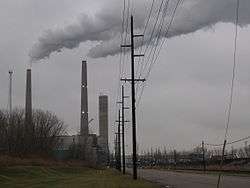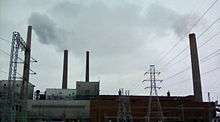DTE Energy Electric Company
DTE Energy Electric Company (formerly The Detroit Edison Company), founded in 1903, is an investor-owned electric utility which serves most of Southeast Michigan. Its parent company, DTE Energy (NYSE: DTE), provides energy services to a variety of clients beyond the DTE Energy Electric Company's service area.
History
Detroit Edison was part of a large holding company called North American Edison Company. North American's stock had once been one of the twelve component stocks of the May 1896 original Dow Jones Industrial Average.[1] North American Company was broken up by the Securities and Exchange Commission, following the United States Supreme Court decision of April 1, 1946.[2]
After that Detroit Edison operated independently, and publicly traded on the New York Stock Exchange, under the ticker symbol DTE through the mid-1990s. In early 1996, it became an operating subsidiary of the new holding company, DTE Energy Company, which replaced Detroit Edison Company on the stock exchange, and took over the trading ticker symbol.[3]
Power generation

The utility operates eleven fossil-fuel generating plants, as well as the Enrico Fermi Nuclear Generating Station. The company is co-owner, with Consumers Energy, of the Ludington Pumped Storage Power Plant, a hydroelectric pumped storage facility in Ludington, Michigan. DTE uses fossil fuels (mainly coal) to generate 80-85 percent of its total electrical output, with the bulk of the remainder coming from nuclear power.[4]
At 3,300 MW, DTE's Monroe Power Plant has the third largest generating capacity of any coal-fired power plant in North America. Only Georgia Power's Plant Bowen located near Atlanta, Georgia and Ontario Power Generation's Nanticoke Generating Station in Canada have more generating capacity.
DTE operates the coal-fired St. Clair Power Plant in St. Clair, Michigan, and the Belle River Power Plant in East China, Michigan on the west bank of the St. Clair River. Also in St. Clair County lies the Greenwood Energy Center, a natural gas-burning and fuel oil-burning plant. [5]
On the Detroit River, DTE operates the River Rouge Power Plant in River Rouge and the Trenton Channel Power Plant in Trenton, which all burn coal.
Energy transmission
As a condition of electric utility deregulation in Michigan, DTE Energy was forced to sell off Detroit Edison's sister subsidiary involved in high-voltage energy transmission: International Transmission Co. (ITC).
Energy distribution
Detroit Edison's near 11-gigawatt generating capacity is offered to its 7,600-square-mile (20,000 km2) service area, which encompasses 13 counties in the southeastern portion of Michigan's lower peninsula. Energy is distributed throughout Huron, Tuscola, Sanilac, Saint Clair, Lapeer, Livingston, Ingham, Oakland, Macomb, Wayne, Washtenaw, Lenawee and Monroe counties by over a million utility poles and 44,000 miles (71,000 km) of power lines.
Detroit Edison's distribution line voltages are three-phase 4,800 volts (Delta) 4,800/8,320 volts (wye) and 7,620/13,200 volts (Wye) . All new distribution circuits constructed after 1959 are 13,200 volts. The 8,320 volt distribution lines are located in Pontiac, Michigan in an area that was served by Consumers Power Company until the mid-1980s when the area was acquired by Detroit Edison. Edison's subtransmission line voltages are 24,000 volts and 41,600 volts.
DTE Rail Service Inc.
With the bankruptcy of the Penn Central Transportation railroad in 1970, Detroit Edison sought to continue transporting coal from the Monongahela mines in Pennsylvania to a brand new power plant in Monroe, Michigan. However, the bankruptcy of Penn Central left Detroit Edison short of motive power and under capacitated coal hoppers. Detroit Edison then chose to purchase brand new locomotives and coal cars to fit their needs. Purchasing EMD SD40's and GE U30C's for mainline motive power as well as High-Side Articulated Gondolas (with a capacity of 185,000 pounds), this new equipment allowed Detroit Edison to move more coal en masse than what Penn Central was able to do with their equipment. The trains were maintained by Detroit Edison officials but operated by Penn Central crews.
By the late 1980s or early 1990, Detroit Edison discontinued use of their equipment, as Conrail began to supply enough locomotives and rolling stock to meet the power company's needs.
References
- ↑ Jeremy J. Siegel, Stocks for the Long Run, McGraw-Hill, Second Edition, 1998, ISBN 0-07-058043-X
- ↑ North American Co. v. Securities and Exchange Commission, 327 U.S. 686 (1946). FindLaw.com
- ↑ Standard & Poor's Stock Guide, April 1996
- ↑ Archived October 19, 2006, at the Wayback Machine.
- ↑
